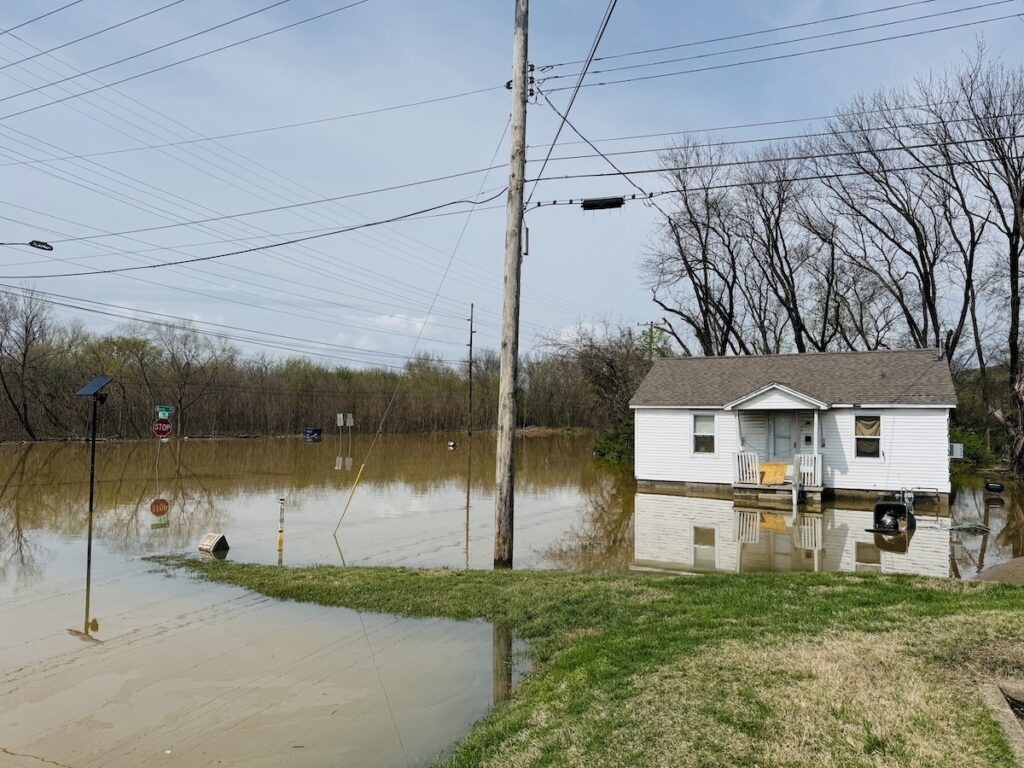For the first time in 2024, the Kentucky General Assembly put a cap on the funds the Kentucky Department of Military Affairs can use to match federal disaster funding when the president declares a disaster or emergency. Since then, Kentucky has seen five emergency or major disaster declarations — including two active disasters.
As a result, Democratic Gov. Andy Beshear said Tuesday that he is likely to run up against the $100 million wall before the end of the two-year budget period — and possibly before the end of the year. Since Kentucky has a part time legislature, the governor would have to call them back into special session to raise the cap or wait until January.
Beshear has long criticized the limit on emergency spending. And given the recent streak of extreme flooding and other disasters, Beshear says the state is sure to hit the cap before the end of the biennial budget next year.

“The fact that we were going to have to have a special session just for a legislature to say, ‘Yes, you can help people.’ You know, that’s silly,” Beshear said. “In the end, what does it cost to protect our people from a natural disaster? It costs what it costs.”
In response, GOP House Speaker David Osborne from Prospect said the legislature can act swiftly to provide for Kentuckians, and will continue to do so. He urged Beshear to focus on using the available funds to the “best of his ability.”
“If the governor feels he needs additional moneys then he knows he can present a proposal for our consideration and, if necessary, call us back for a special session,” Osborne said in a statement.
The Republican-controlled legislature already expanded the disaster cap in the final days of the legislative session last month, after severe flooding rocked eastern Kentucky in mid-February. Along with creating a new SAFE fund, which allowed the governor to spend previously appropriated funds for the new emergencies, lawmakers also allowed the governor to use the full $100 million allotted over a two year period immediately.
At the time, Sen. President Robert Stivers, a Republican from Manchester, said newly available funding would be enough to help families and local businesses avoid “a web of delays.”
“That’s why I was determined to drive making these funds available immediately, so eastern Kentucky gets the support it needs without unnecessary obstacles,” Stivers said. “Our region has had more than its fair share of adversity, and this measure reinforces our dedication to rebuilding more quickly and with full transparency.”
But with this latest emergency disaster declaration largely affecting western and central Kentucky, Beshear said those funds will likely be insufficient, putting lives at risk. Incessant flooding is still ongoing across Kentucky this week, after severe storms dumped up to 15 inches of rain across portions of the state.
Stivers has said he would consider allocating more funds if needed during the next session or in a potential special session after passing the most recent disaster relief law, House Bill 544.
“We try to be as wise as we can on what we spend,” Beshear said. “But listen, if people are going to run out of water, we’re going to run pallets of water to them. If we drop too much water, we’ll go and pick it back up. But we don’t want anybody going thirsty.”
Beshear said it also costs money to put in place the infrastructure ahead of disasters to limit lives lost, like swift water rescue teams. He said he hopes this is the last two-year budget in which the legislature attempts to limit his spending to respond to emergencies and natural disasters.
When lawmakers put in place the cap in 2024, they said the caps were to aid in accurate budgeting and immediate emergencies could be addressed in a special session. GOP Rep. Jason Petrie of Elkton, the chairman of the House budget committee, said at the time that the caps were created by gauging “historic levels over time.”
“If there is some immediate emergency need of great impact, then I would suspect the need of the General Assembly to be called back into session to address such a catastrophic event,” Petrie said before passing the budget last year.
Calling the legislature into special session also costs money and takes time. But lawmakers say the extra time and money needed would be worth it to protect the legislature’s power of the purse.
This story has been updated to include additional details from House Speaker David Osborne.
This story is republished with permission from Kentucky Public Radio. Read the original.
Sylvia Goodman is Kentucky Public Radio's Capitol reporter. Email her at sgoodman@lpm.org.



